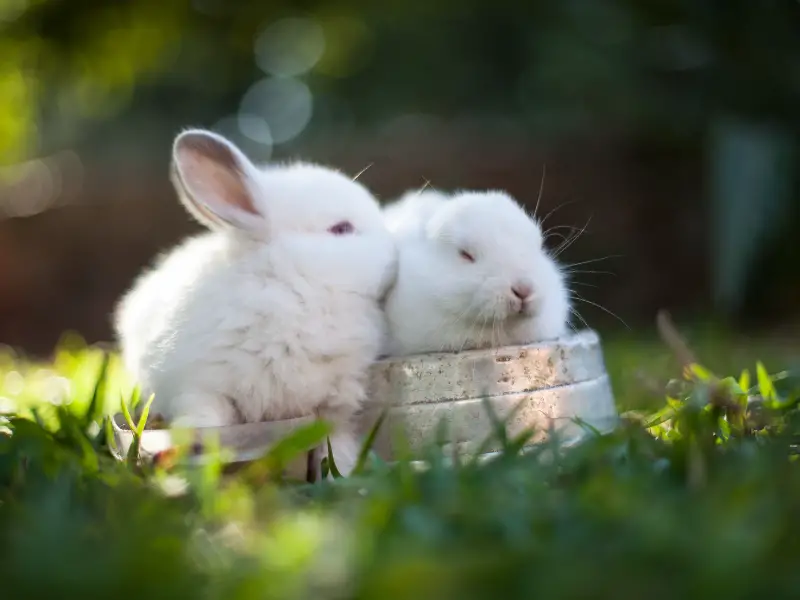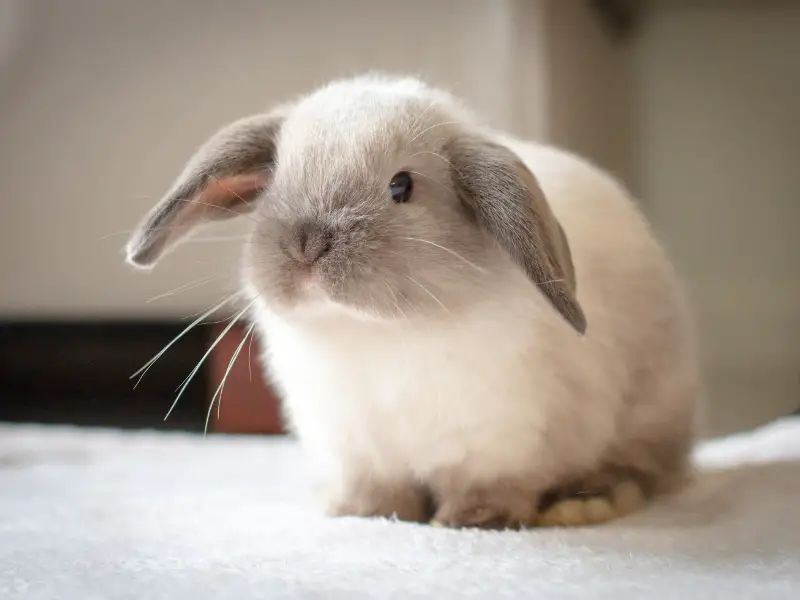Have you ever wondered if rabbit whiskers are a thing? It’s almost as if we were born knowing that cats have whiskers, but the same can’t be said when it comes to bunnies.
So do rabbits have whiskers?
Rabbits do have whiskers. They can be seen on your bunny’s face, with the most visible whiskers being on its cheeks. Whiskers mainly help your bunny measure spaces and make sense of what they can’t clearly see in front of them.
Today, we’ll explore everything you need to know about our fluffy friends and their whiskers.
Do All Bunnies Have Whiskers?
Every rabbit – wild and domestic – has whiskers on its face, with whiskers above its eyes, on its cheeks, and next to its mouth and nose. Also known as vibrissae, whiskers are a type of stiff and thick hair.
Most of your bun’s whiskers can be found:
- Around the mouth. These whiskers are shorter and a bit harder to see. They’re responsible for helping bunnies with object recognition.
- The middle of their cheeks. These are the longest and most noticeable whiskers you’ll see on your rabbit’s face. They have deep-rooted follicles and sensitive nerves that assist Ms. Fluffles with spatial awareness.
Whiskers give your bunny a sense of touch and make a huge difference in their lives on a daily basis. A bunny can have as many as 100 whiskers, with some measuring as long as the width of a rabbit’s body.
Why Do Bunnies Have Whiskers?
Whiskers are more important to your bunny than most people realize. There are various reasons why rabbits have whiskers:
Navigation
One of the primary reasons your pet rabbit has whiskers is that they help your bun process its surroundings. Your fluffy bestie can’t see well at close range, so it needs its whiskers to help identify objects, navigate its environment, and get around in the dark.
Whiskers serve as a sophisticated system that translates vibrations into messages for rabbits. This is how your bunny is able to interpret what’s in front of it.
Without their whiskers, rabbits could easily find themselves getting stuck in small spaces or feeling disorientated, and your bunny can easily harm themselves.
Communication
When your rabbit engages with an animal it’s never encountered before, it will first make contact by using its whiskers.
But, beware!
If your pet is trying to show dominance over another bunny, they may chew off their whiskers – a practice referred to as barbering.
Protection
Whiskers help Ms. Fluffles keep small particles away from her eyes. Although your bunny has a membrane (known as the third eye) preventing things from getting inside, whiskers serve as extra protection against dust and debris.
Because of the sensory feedback given by the whiskers around the eyes, your bun is also able to detect how close an object is to its head.
Do Bunnies Need Whiskers?

Rabbits can survive without whiskers. But this would have a major impact on the way they function in their environment.
Whiskers give your bunny a way to perceive its immediate surroundings. Without them, it would be more difficult to judge spaces, identify objects, and move from one place to the other at night.
Bunnies are constantly relying on their whiskers for survival. If they were to lose their whiskers, they would lose their sense of touch.
Can Bunnies Feel Pain in Their Whiskers?
Whiskers are actually just hair. Just as you don’t feel pain when you cut your hair, neither does your bunny.
The only time your furry friend may experience hair-related pain is if a whisker’s follicle is pulled out.
Picture plucking a strand of hair from your head. It may sting at first, but the sensation would disappear after a while. The same would apply to your bunny.
Can I Cut My Bunny’s Whiskers?
It’s not advisable to cut your bunny’s whiskers. As you know by now, whiskers help your furry friend live its best and safest life.
Don’t snip its whiskers just because you feel:
- They’re too long
- They seem like they’re getting in the way
- You want to tidy up your bunny’s facial hair
If Mr. Fluffles accidentally gets some of his whiskers caught on anything, like a fence, and a section of them gets chopped off in the process, don’t panic. This won’t negatively affect him, and his whiskers should grow back to their normal size in no time.
If your rabbit’s whiskers are damaged and seem like they’re starting to curl at the tips, it wouldn’t be the end of the world if you had to trim the ends. In fact, this can lead to healthy regrowth.
But, keep in mind that some bunny breeds (like the Rex and Mini Rex) naturally have curly whiskers, so they wouldn’t need to be trimmed at all!
Other Ways Your Bunny Could Lose Its Whiskers (Besides Cutting)
Whisker loss in rabbits is not unheard of. For the most part, whiskers can fall off because of natural causes (such as old age).
Here are other reasons why your bunny could be losing its whiskers:
Shedding Season
It’s natural for rabbits to shed their hair, including their whiskers. Shedding gets rid of old hair and makes space for a new fur coat.
Fighting With Other Bunnies
A rabbit’s face is one of the main targets during a fight – with another rabbit. So it’s a real possibility that its whiskers will get broken or even chewed off!
Infections
If bacterial and fungal infections affect the face of your pet bunny, this can lead to a loss of whiskers.
Alopecia
Alopecia is a condition responsible for major hair loss, not only in rabbits but in other animals and humans. Hair all over the body, including whiskers, could fall out.
Dermatitis
Dermatitis, along with other skin conditions, is a result of an allergic reaction that leads to your rabbit shedding its whiskers.
Parasites
Fur and whisker loss won’t be the only symptom if your bunny is infected with mites. Your furry bestie will also have inflamed and irritated skin.
Hormone Imbalance
Not only can a hormone imbalance or disorder result in whiskers falling out, but it may also lead to changes in the texture of your bun’s whiskers when they grow back.
If your bunny is losing its whiskers at an alarming rate, head straight for your vet.
My Last Bunny Thoughts
To wrap things up, whiskers are key in getting your little bundle of fluff from one day to the next. They do a lot more than just a cute nose wiggle when your bunny is sniffing around.
Now that you know how vital whiskers are, do everything you can to help your fluffy bestie protect them. And if you’re ever worried about your bun’s whiskers for whatever reason, don’t hesitate to pay a visit to your trusted bunny vet.
Related Articles:

